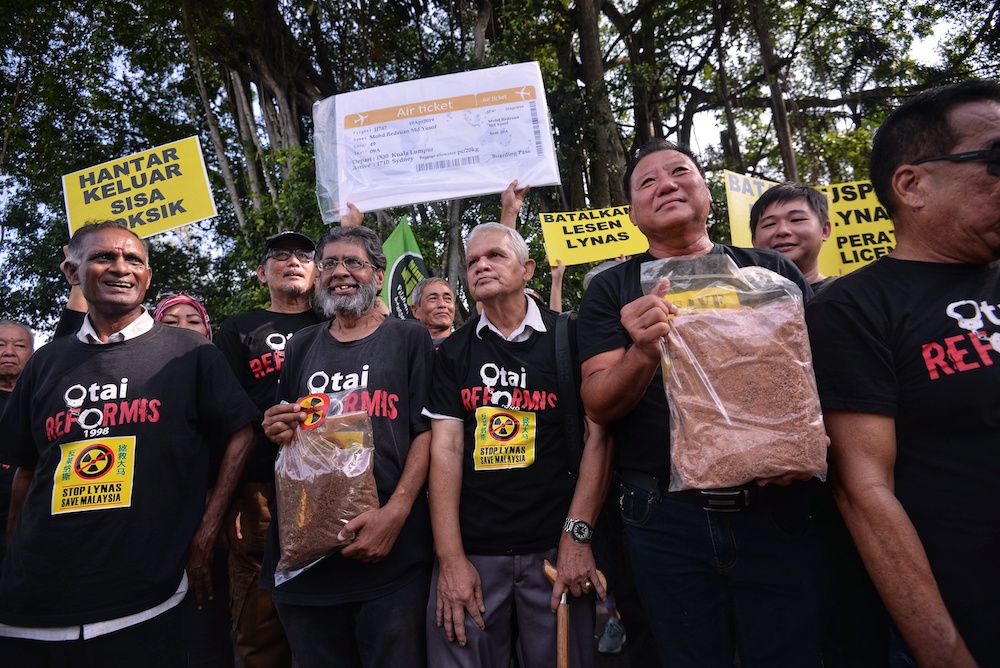KUALA LUMPUR, Aug 28 — Putrajaya must scrutinise foreign investment and not put financial gains above environmental concerns, environmental groups said after the government warned against scaring off investors if the controversial rare earth miner Lynas Corp were shunned.
Malaysian Nature Society president Ahmad Ismail said Malaysians in general are not against foreign investments but are genuinely concerned with the many instances of pollution stemming from industrial activities.
“Related to the environmental issues, there were many industries either from local and international investors polluting our environment. We can list them. The incident in Sungai Kim Kim and Pasir Gudang were the recent ones.
“How many rivers were polluted due to effluents from industries? If we monitor it closely since Malaysia is dominating in the rubber and palm oil industries, we can see our environment, including aquatic ecosystems, are polluted,” the professor told Malay Mail.
Meanwhile, Pertubuhan Pelindung Khazanah Alam Malaysia (Peka) questioned whether the investment justified the damage done to the environment and which the future generations will one day inherit.
“It’s very expensive to dispose of the waste generated from the factories. One fingernail’s worth of waste must be buried with almost 30 sq ft of concrete,” Peka vice-president Sophine Tann said.
“[Prime Minister Tun Dr Mahathir Mohamad] says Lynas are giving us a lot of money but can we eat money? What happens in the future when the water supply and natural resources in the area are dead?”
On Monday, Dr Mahathir warned that attempts to cast out Lynas Malaysia Sdn Bhd like a “pariah” would harm Malaysia’s standing among potential international investors.
He said Lynas’ investment involves RM1.7 billion and it creates 700 “high quality, high paying” jobs that are necessary for the country.
Prior to that, International Trade and Industry Minister Darell Leiking had said that the Lynas experience in Malaysia should not be seen as a deterrent to investors when doing business here.
Despite Dr Mahathir’s insistence that government’s experts have also concluded that the by-products of the Lynas refinery were “not dangerous”, Ahmad advised for all stakeholders to adhere to scientific facts and data when discussing the issue.
“Regarding Lynas because the issue was publicly highlighted and have attracted the attention of the public, especially on the radioactive materials which became a big issue, detailed studies need to be done to include similar industries in other places to compare with.
“Experts must involve explaining the issues to the public and the authorities. The industry and the authorities then must follow the advice of the experts who understand the matter material and procedures,’’ he said.
As a way forward, the Environmental Protection Society of Malaysia said the country should be more selective of foreign investment, instead of encouraging investment from waste-producing industries.
“As a developing country, Malaysia is already at a stage where it can discern and only select investments which add value to the economy and contribute to a low-carbon development pathway and green economy.
“By this I mean investments which contribute to the economy, and which are also low carbon and resource efficient. As a signatory to the Paris Agreement we are obligated to do so,” its president Nithi Nesadurai said.
Lynas has been operating a rare earth refinery in Kuantan, Pahang since 2012, and has over the years faced protests including renewed objections recently before and when the Malaysian government granted it a six-month extension from September 3. Lynas’ operating licence was due to expire on September 2.
Before giving Lynas the extension, Putrajaya had in December initially demanded that the company ship out waste with low-levels of radioactivity-produced at the rare earth plant in Pahang and totalling 451,564 metric tonnes by then — out of Malaysia as a condition for its licence renewal.
Following Australia’s refusal to accept the waste, the Malaysian government then asked Lynas to make plans for a permanent disposal facility within Malaysia for the radioactive waste or alternatively to seek approval from foreign authorities to send the waste abroad, setting it as part of the three conditions for a six-month operating extension.



















